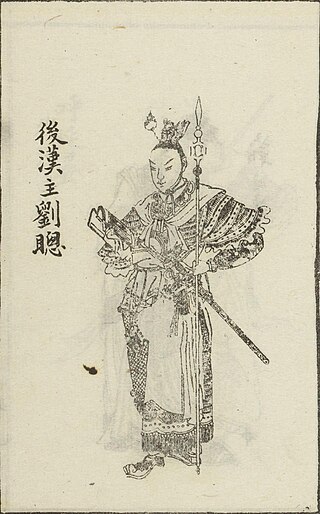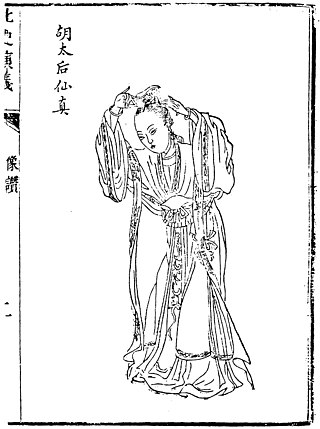Related Research Articles
Year 349 (CCCXLIX) was a common year starting on Sunday of the Julian calendar. At the time, it was known as the Year of the Consulship of Limenius and Catullinus. The denomination 349 for this year has been used since the early medieval period, when the Anno Domini calendar era became the prevalent method in Europe for naming years.

Zhao, briefly known officially as Wei (衛) in 350, known in historiography as the Later Zhao or Shi Zhao (石趙), was a dynasty of China ruled by the Shi family of Jie ethnicity during the Sixteen Kingdoms period. Among the Sixteen Kingdoms, the Later Zhao was the second in territorial size to the Former Qin dynasty that once unified northern China under Fu Jian.
Ran Min, also known as Shi Min (石閔), posthumously honored by the Former Yan as Heavenly King Wudao of (Ran) Wei ( 魏武悼天王), courtesy name Yongzeng (永曾), nickname Jinu (棘奴), was a military leader during the era of Sixteen Kingdoms in China and the only emperor of the short-lived state Ran Wei (冉魏). He was known for ordering the culling of the Jie and other barbarians, during which 200,000 people, both Han and non-Han people, were killed between 349 and 350.

Liu Cong (died 31 August 318), courtesy name Xuanming, nickname Zai, also known by his posthumous name as the Emperor Zhaowu of Han (Zhao), was an emperor of the Xiongnu-led Chinese Han-Zhao dynasty. He captured the Emperor Huai of Jin and the Emperor Min of Jin, and executed them back in Pingyang after forcing them to act as cupbearers. These raids finally forced the Jin dynasty to move its capital from Luoyang to Nanjing.
Empress Liu was an empress consort of China's Later Zhao dynasty. Her husband was the founder of the empire, Shi Le.
Empress Dowager Cheng was an empress dowager of the Jie-led Later Zhao dynasty of China. She was a concubine of Later Zhao's founding emperor Shi Le and gave birth to his crown prince and successor, Shi Hong. Her brother Cheng Xia was one of Shi Le's key advisors, particularly after Zhang Bin's death.
Shi Hong (石弘) (313–334), courtesy name Daya (大雅), was briefly an emperor of the Jie-led Later Zhao dynasty of China after the death of his father Shi Le, Later Zhao's founder. Because after his cousin Shi Hu deposed him, he was created the Prince of Haiyang (海陽王), he is sometimes known by that title.
Shi Hu, courtesy name Jilong (季龍), also known by his posthumous name as the Emperor Wu of Later Zhao (後趙武帝), was an emperor of the Jie-led Chinese Later Zhao dynasty. He was the founding emperor Shi Le 's distant nephew and adoptive brother, who took power in a coup after Shi Le's death from Shi Le's heir Shi Hong. Due to Tang dynasty naming taboo, he is referred to as Shi Jilong (石季龍) in the Book of Jin.
Zheng Yingtao was an empress consort of China's Jie-led Later Zhao dynasty. She was Shi Hu 's first empress, but not his first wife.
Du Zhu was an empress of the Chinese/Jie state Later Zhao. She was Shi Hu 's second empress.
Empress Liu (318–349) was an empress consort of the Jie-led Later Zhao dynasty of China. She was Shi Hu 's third and final empress. She served as regent in 349.
Shi Shi was briefly the emperor of the Jie-led Later Zhao dynasty of China following his father Shi Hu's death in 349. In the Chinese annals, he is sometimes referred to by his title after removal as an Emperor, Prince of Qiao (譙王).
Shi Jian was briefly an emperor of the Jie-led Later Zhao dynasty of China. He was the third of four short-lived Later Zhao emperors after the death of his father Shi Hu. He is sometimes referred to by his title prior to becoming emperor, Prince of Yiyang (義陽王). Arguably, it was his machinations with his powerful adoptive nephew Shi Min against his brother Shi Zun that finally led to Later Zhao's downfall.
Fu Jian, originally named Pu Jian, courtesy name Jianye (建業), also known by his posthumous name as the Emperor Jingming of Former Qin (前秦景明帝), was the founding emperor of the Di-led Chinese Former Qin dynasty.

Empress Dowager Hu, formally Empress Ling (靈皇后), was an empress dowager of the Xianbei-led Chinese Northern Wei dynasty (515-528). She was a concubine of Emperor Xuanwu, and she became regent and empress dowager after her son Emperor Xiaoming became emperor after Emperor Xuanwu's death in 515. She was considered to be intelligent but overly lenient, and during her regency, many agrarian rebellions occurred while corruption raged among imperial officials. In 528, she was believed to have poisoned her son Emperor Xiaoming after he tried to have her lover Zheng Yan (鄭儼) executed. This caused the general Erzhu Rong to attack and capture the capital Luoyang. Erzhu threw her into the Yellow River to drown.
Emperor Xiaoming of (Northern) Wei ( 魏孝明帝), personal name Yuan Xu (元詡), was an emperor of the Xianbei-led Chinese Northern Wei dynasty. He ascended the throne in 515 at the age of five, and governmental matters were dominated by his mother Empress Dowager Hu. In 528, Emperor Xiaoming tried to curb his mother's powers and kill her lover Zheng Yan (鄭儼) by conspiring with the general Erzhu Rong. As a result, the 18-year-old emperor was poisoned by his mother, who was soon overthrown by Erzhu. From that point on, Northern Wei royal lineage had no actual power. The next ruler, Emperor Xiaozhuang (507–531) was established by Erzhu. Since Erzhu's rival, general Gao Huan, enthroned another royal offspring, the country was soon split in two rival polities, Eastern and Western Wei, both of which did not hold long on the political map of the Southern and Northern Dynasties.

How Much Sorrow Do You Have, also known as The Real Warrior in some countries, is a 2005 Chinese historical drama produced by Beijing HualuBaina Film & TV Co. It was first broadcast on China Television in Taiwan in August 2005. In mainland China it was first broadcast on CCTV-8 in 2006. The title is directly taken from a poem by Li Yu, the protagonist of the drama.
Li Nong was a Chinese military general and politician of the Later Zhao and Ran Wei dynasties during the Sixteen Kingdoms period. He was a notable official under Later Zhao's emperor Shi Hu, fighting against the Jin and Former Yan dynasties. When the conflict between Shi Hu's family and his adopted ethnic Han grandson Shi Min arose in 349, he allied with the latter, and together they brought upon the destruction of Later Zhao, ending what was virtually a 20-year-long unity in northern China. However, just a year after, Li Nong and his family were executed by Ran Min for unspecified reasons.
Yao Yizhong (280–352), posthumously honored as Emperor Jingyuan, was a Qiang military general of the Later Zhao dynasty during the Sixteen Kingdoms period. Starting out as a refugee leader during the Disaster of Yongjia, Yizhong later submitted to Later Zhao in 329, where he became a favorite general of the state's third ruler, Shi Hu. As Zhao collapsed in 350, he sided with Shi Zhi against the Ran Wei breakaway state, becoming one of Shi Zhi's top commanders, but ultimately could not prevent the state’s demise. After his death in 352, his fifth son Yao Xiang led his family to join the Jin dynasty (266–420) before becoming a roving warlord in the Central Plains. Yizhong's twenty-fourth son, Yao Chang, would go on to establish the Later Qin dynasty and posthumously honor him as an emperor in 384.
Zhang Chai was a minister of China's Later Zhao dynasty during the Sixteen Kingdoms period. He was a close ally to Shi Hu 's empress, Empress Liu, who helped her establish themselves as the paramount leaders of Zhao through her son Shi Shi following the death of Shi Hu in 349. The pair attempted to centralize their power and eliminate their rivals, but a popular coup led by Shi Zun saw their reign barely lasting a month as they were removed and subsequently executed. Despite the coup, it would soon be known as the beginning of a bigger power struggle within the Shi family over the throne that led to the destruction of Later Zhao in 351 in the hands of Ran Min.
References
- ↑ Tsao, Joanne (2020-01-07). "Ye the Dynastic Capital". The City of Ye in the Chinese Literary Landscape. Brill. p. 83. doi:10.1163/9789004420144_005. ISBN 978-90-04-42014-4. S2CID 213733749.
- ↑ Routledge Handbook of Imperial Chinese History. Victor Cunrui Xiong, Kenneth James Hammond. Abingdon, Oxon. 2019. p. 85. ISBN 978-1-315-72687-8. OCLC 1054093092.
{{cite book}}: CS1 maint: location missing publisher (link) CS1 maint: others (link)